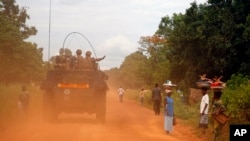GENEVA —
United Nations aid agencies are scaling up humanitarian operations in the Central African Republic (CAR) as the rainy season takes hold in that war-torn country.
The onset of rains intensifies the vulnerability of some 400,000 internally displaced people within the country who are dependent upon life-saving international aid.
As roads become impassable, humanitarian agencies are having greater difficulty reaching many of these desperate people.
And the dangers have not gone away.
The Organization for the Coordination of Humanitarian Affairs reported confrontations between armed troops and direct attacks on villages over the past week in the central part of the country have caused more than 5,000 people to flee their homes and seek shelter in religious sites.
OCHA spokesman Jens Laerke says access to these areas is limited.
"One area where access has actually improved slightly is in Boda, where we have been able to provide additional relief for 24,000 vulnerable people," Laerke said. "There has been food distribution, medical, nutrition, non-food items and WASH [water, sanitation and health] support has been provided."
Despite the security risks, the World Food Program said it has managed to distribute food to more than 140,000 people this month.
In anticipation of the rainy season, WFP spokeswoman Elizabeth Byrs told VOA the agency began pre-positioning food early this month and, in conjunction with the Food and Agriculture Organization, has started to distribute seeds and tools to help farmers plant their crops.
"In parallel, WFP is providing food rations to the same people so that they do not have to eat the seeds for the agricultural season. … Most roads are impassable and ... thousands of people will be in need of assistance," Byrs said. "That is why it was very important to start those distributions as early as possible."
She says WFP will continue to scale up its operation.
The U.N. Children's Fund reported the number of children being treated for severe acute malnutrition in Bangui's largest hospital has tripled compared to last year.
UNICEF estimated 28,000 children will suffer from this worst form of malnutrition this year. It also said it is ramping up its nutritional treatment program to keep these children alive.
U.N. agencies said their efforts to address the country's humanitarian crisis is hampered by a serious lack of money, and they note that only 28 percent of the international appeal for $551 million in funds has been received.
The onset of rains intensifies the vulnerability of some 400,000 internally displaced people within the country who are dependent upon life-saving international aid.
As roads become impassable, humanitarian agencies are having greater difficulty reaching many of these desperate people.
And the dangers have not gone away.
The Organization for the Coordination of Humanitarian Affairs reported confrontations between armed troops and direct attacks on villages over the past week in the central part of the country have caused more than 5,000 people to flee their homes and seek shelter in religious sites.
OCHA spokesman Jens Laerke says access to these areas is limited.
"One area where access has actually improved slightly is in Boda, where we have been able to provide additional relief for 24,000 vulnerable people," Laerke said. "There has been food distribution, medical, nutrition, non-food items and WASH [water, sanitation and health] support has been provided."
Despite the security risks, the World Food Program said it has managed to distribute food to more than 140,000 people this month.
In anticipation of the rainy season, WFP spokeswoman Elizabeth Byrs told VOA the agency began pre-positioning food early this month and, in conjunction with the Food and Agriculture Organization, has started to distribute seeds and tools to help farmers plant their crops.
"In parallel, WFP is providing food rations to the same people so that they do not have to eat the seeds for the agricultural season. … Most roads are impassable and ... thousands of people will be in need of assistance," Byrs said. "That is why it was very important to start those distributions as early as possible."
She says WFP will continue to scale up its operation.
The U.N. Children's Fund reported the number of children being treated for severe acute malnutrition in Bangui's largest hospital has tripled compared to last year.
UNICEF estimated 28,000 children will suffer from this worst form of malnutrition this year. It also said it is ramping up its nutritional treatment program to keep these children alive.
U.N. agencies said their efforts to address the country's humanitarian crisis is hampered by a serious lack of money, and they note that only 28 percent of the international appeal for $551 million in funds has been received.




